
Capacity building to strengthen networks of higher education institutions and their cooperation with surrounding ecosystems is one of the goals of the EU. In this context, the EU-funded WATERLINE project aims to create a European Digital Water Higher Education Institution Alliance based on the quadruple helix model of innovation, which recognizes four major factors in the innovation system: science, policy, industry and society. This approach will lead to the development of the Alliance’s research, educational and entrepreneurship capacities. To achieve its goals, the project will co-create a common governance framework and a portfolio of water components that will support in the setting up of emulative centres through assisted and virtual reality, amongst other actions.
WATERLINE aims to create a European Digital Water Higher Education Institution (HEI) Alliance, based on the quadruple helix model of innovation, leading to the development of the Alliance’s research, educational and entrepreneurship capacities. This shall leverage the individual, institutional and regional resources required for a transformative structural and sustainable learning and innovation environment.
To achieve this, WATERLINE has five specific objectives:
1. Support consolidation of the Alliance by co-creating a common governance framework, and a Research & Innovation (R&I) capacity building plan
2. Co-create a portfolio of water components for Master level and transform emulative laboratories in partner Widening HEIs into assisted and virtual reality. These structural changes will lead to transformed and more competitive R&I HEIs
3. Strengthen WATERLINE researchers’ R&I capacity excellence by implementing activities, such as summer schools to enhance education and R&I skills, and proposal writing workshop
4. Build a European network of academics/researchers who, together with quadruple helix actors, will allow knowledge flow in water domains and extended reality technologies. This allows greater involvement of regional actors in the R&I process and enhances one of the major societal challenges: water-related education. Moreover, it will strengthen academic and business links through academia-to-business meetings and a hackathon to mainstream entrepreneurship mindsets;
5. Sustain the alliance by:
(i) establishing ambassador networks,
(ii) identifying the R&I funding landscape, thus increasing participation in HE and the mobilisation of resources in the water sphere,
(iii) creating synergies with EU initiatives, institutions, other projects and networks.
TIME | TOPIC | PRESENTED BY |
|---|---|---|
INTRODUCTION TO THE PROGRAM | ||
09:00 | Check-in and a round of introduction to break the ice | Rasha Hassan/NMBU |
09:30 | Presentation on WP5 and its updates Rasha Hassan/NMBU | Rasha Hassan/NMBU |
COLLABORATIVE AND PLATFORM PROJECTS | ||
10:15 | Best practices in ERASMUS+ calls | Milan Gocic/UNI |
12:00 | Lunch break | |
13:00 | Conceptualizing collaborative and platform projects | Harsha Ratnaweera/NMBU |
RESEARCH PROPOSALS | ||
14:00 | Presentation of good practices including MSCA | Agnieszka Cuprys/NMBU |
14:30 | Structure of scientific research proposals | Zakhar Maletskyi/NMBU |
GROUP WORK | ||
15:00 – 17:00 | (15:00-15:15) Introduction to the Groups work, objectives and logistics (15:15 -16:00) Breakout rooms and GroupMap (16:00-16:30) Debriefing (16:30-17:00) Wrap up | NMBU |
TIME | TOPIC | PRESENTED BY |
|---|---|---|
BEST PRACTICES IN EU CALLS | ||
09:00 | Check-in and a round of introduction to break the ice | Naomi Timmer/H2O people |
09:30 | Best practices in promoting the social impact and young professional in the HE proposals | Naomi Timmer/H2O people |
11:00 | Tips and tricks on Horizon Europe projects | NMBU |
12:00 | Lunch break | |
13:00 | Best practices in Prima calls | TBC |
14:00 | Finding the perfect match in HE calls for your idea presentation with Q&A | TBC |
GROUP WORK | ||
15:00 – 17:00 | (15:00-16:00) GroupMap to develop the proposal (16:00-16:30) Debriefing (16:30-17:00) Wrap up | NMBU |
TIME | TOPIC | PRESENTED BY |
|---|---|---|
HOW TO FORM THE CONSORTIA | ||
09:00 | Check-in | Rasha Hassan/NMBU |
09:30 | Presentation on the Hot topics in Horizon Europe | Leonardo Piccineeti/SITES |
11:30 | Looking for partners and joining consortia | Rasha Hassan/NMBU |
12:00 | Lunch break | |
GROUP WORK | ||
14:00 – 17:00 | (14:00-15:00) GroupMap to develop the proposal (15:00-16:00) Debriefing (16:00-17:00) Wrap up |
Date of publication: 06.11.2023
On November 3rd, Harsha Ratnaweera moderated a face-to-face workshop on Digital Water in Norway, and the event was a resounding success! It brought together representatives from universities, businesses, government, and the community to discuss the intricate aspects of co-creating the Digital Water Higher Education Institution (HEI) Alliance within #waterline. We delved into the challenges we face, the needs we must address, and the gaps that need to be filled.
The insights shared during this workshop were not only valuable but also perfectly aligned with the Norwegian context. The next step on this exciting journey is being taken by the Norwegian Regional Committee of Practice for Digital Water, as they prepare to craft a comprehensive roadmap. This roadmap will serve as a guiding framework, enabling the WATERLINE consortium to collaborate effectively and establish a shared governance structure for the WATERLINE campus.
However, this is just the beginning! Our commitment to enhancing digital water solutions remains steadfast. We have a plethora of plans and ideas for the future, all aimed at making digital water even more efficient and sustainable. We invite you to stay in the loop and become a part of this exhilarating journey with us.
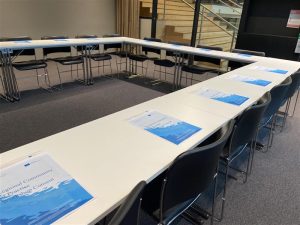
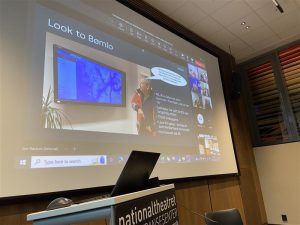
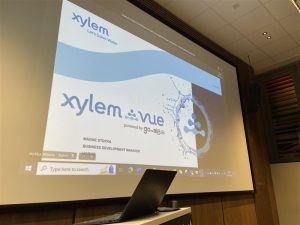
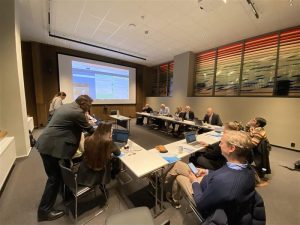
Date of publication of the press release: 30.11.2023
WATERLINE project, which receives funding from the European Union’s Horizon Europe, aims to create a European Digital Water Higher Education Institution Alliance, based on the quadruple helix model of innovation, leading to the development of the Alliance’s research, educational and entrepreneurship capacities. This shall leverage the individual, institutional and regional resources required for a transformative structural and sustainable learning and innovation environment.
The partners of the WATERLINE project, which include a consortium of ten beneficiaries and five associated partners from 11 European countries met at the innovation capacity building summer school at the University of Exeter United Kingdom. The event took place between 29 August and 4 September 2023, giving the opportunity to partners to participate also online on some of the days. During the first two days, participants attended a personal and professional development seminar delivered by H2O People, one of WATERLINE’s partners.
During the following days, participants attended design thinking, developer talks, an innovation workshop, carried out a hands-on development and testing at VSimulators and conducted a review of virtual reality solutions and future development.
The Centre for Water Systems (CWS) of the University of Exeter celebrated its 25th anniversary in August 2023 and hosted a two-day celebration event to mark this special occasion: ‘Advances in Water Research & Innovation: 1998 to 2023 and beyond’. Over 110 past and present CWS members, including staff, postgraduate research students, visitors, and other academic and industrial colleagues were invited to participate in the celebrations. Participants from the WATERLINE summer school also attended some of the celebration activities and networked with others who were invited to the celebrations to disseminate and raise awareness about WATERLINE. A themed workshop on “Extended Reality in Water Research and Education” was held jointly by CWS and WATERLINE to explore opportunities and identify challenges in using digital technologies to build research capacity and develop practical skills and knowledge of the next generation of water scientists and engineers.
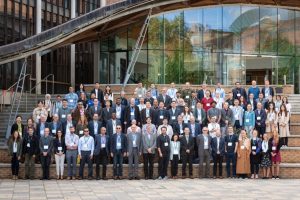
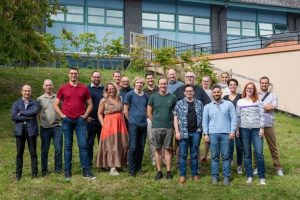
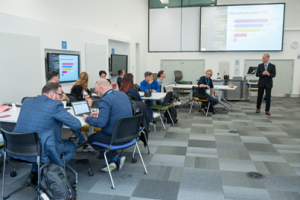
WATERLINE, a three-year-long project, receives funding from the European Union’s Horizon Europe HORIZON-WIDERA-2021-ACCESS-05 under grant agreement No 101071306. Views and opinions expressed are however those of the author(s) only and do not necessarily reflect those of the European Union or the European Research Executive Agency (REA). Neither the European Union nor the granting authority can be held responsible for them.
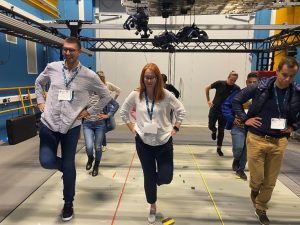
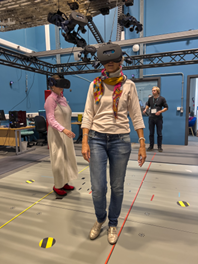
Coordinator: Malta College of Arts, Science and Technology (MCAST)

